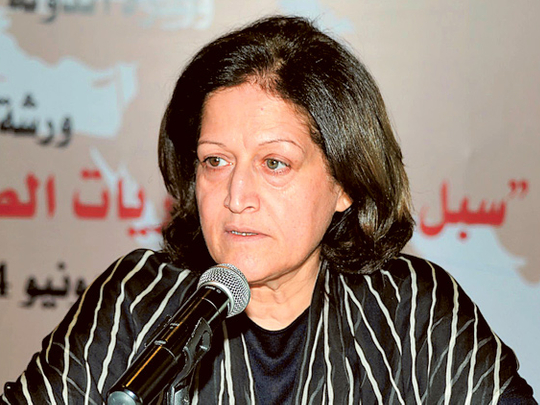
Manama: Bahrain’s leaders reject the idea of resorting to sectarian quotas, a government minister has said.
“Sectarian quotas are totally discarded and Bahrain will never adopt them,” Sameera Bin Rajab, the state minister for information affairs and the official government’s spokesperson, said. “Bahrain does not want a repeat of the civil wars lived by the societies that adopted such a system,” she said in remarks carried by Bahrain News Agency (BNA).
The idea of introducing a sectarian quota as a system to help end a political crisis resulting from sharp differences over the events that hit the country in February and March 2011 has been floated by some parties.
However, the country’s leaders do not adhere to such a concept, Sameera said.
“The country’s leadership does not support any sectarian ideas or approaches,” she said. “There will be no sectarian quotas and whatever has been raised recently about such a system is tainted with misinformation,” she said.
The minister added that consultations between the Royal Court and the stakeholders in the national dialogue to end the crisis were continuing.
“The talks are going on in order to draft the main agenda of the issues to be discussed around the table,” she said. “The Royal Court, as the patron of the national dialogue, is determined that the consultations continue in order to reach agreements that are significant and necessary. There will be no decisions that will be imposed on any party since Bahrain is a pluralistic kingdom and there is a need to be fully committed to this pluralism through agreements by all parties,” she said.
The National Dialogue was launched in July 2011 to help the country out of the worst crisis to hit it in modern times and address social and political wounds resulting from the dramatic events that occurred in February.
Almost 300 people representing the parliament, political societies, NGOs, the media, the government, labour unions, and women’s rights groups took part in the sessions and agreed on a series of recommendations that included amendments to the constitution that gave more powers to the elected chamber. The decisions were implemented.
A new round of the National Dialogue was launched on February 10 last year to address political issues that had not been included in the earlier round in July 2011.
At the political talks, 27 participants representing a coalition of opposition societies, a coalition of other political societies, the parliament and the government held a series of rounds.
However, sharp disagreements over the platform and the outcome of the dialogue have stalled it for weeks.
The dialogue was eventually suspended after the opposition froze its participation in September and the other parties decided in January not to continue the talks.
However, Crown Prince Salman Bin Hamad Al Khalifa, determined to reach an agreement despite the formidable challenges, launched an initiative to bring the stakeholders back to the table.
He met the heads of all major political societies in Bahrain separately and discussed with them the resumption of the National Dialogue, following the recent postponement of the talks.
“Under instructions from His Majesty King Hamad Bin Eisa Al Khalifa, His Royal Highness Prince Salman Bin Hamad Al Khalifa, Crown Prince, Deputy Supreme Commander and First Deputy Prime Minister, met the parties participating in the National Dialogue to discuss ways of overcoming the recent challenges to the sessions,” Sameera said in a statement in January.
“The participants agreed to start a new phase of the dialogue based on interaction and convergence of views among all parties, commitment to the principles of responsibility, seriousness, transparency and credibility and to raising the nation’s best interests above all other considerations,” she added.
According to BNA, Prince Salman “discussed means to overcome the obstacles to dialogue and highlighted the need for renewed urgency in the process”.
He stressed the importance of senior representation from all sides, emphasising the significance of an improved and open political environment that can clearly and positively address national priorities shared by all Bahrainis as well as accounting for the concerns held by different communities, the official news agency said.
“Over a decade ago His Majesty the King recognised the importance of a process of inclusive political development,” Prince Salman said following the meetings. “We remain firmly committed to stable political development, one that is representative of all sides and thereby acts definitively in the national interest.”
As a broad framework of core topics for the dialogue was agreed, all parties have reportedly committed themselves to accelerating dialogue and elevating discussions by including senior representatives from all parties.












